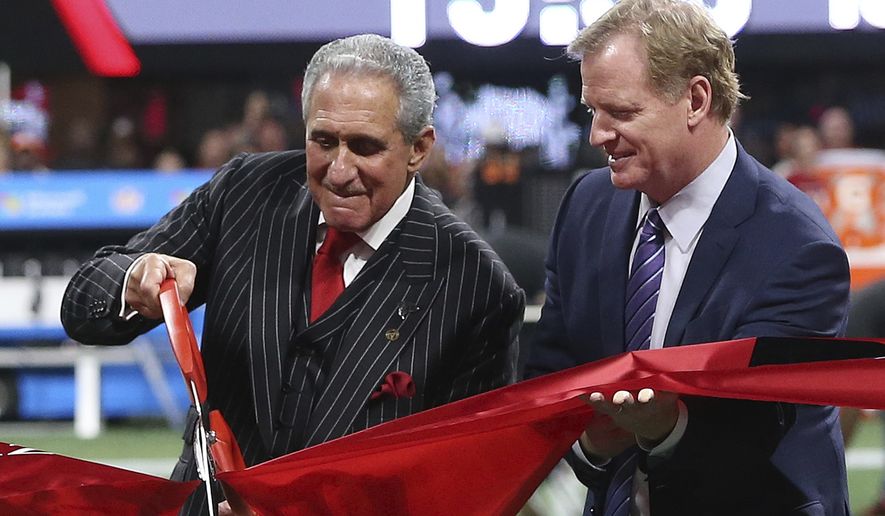The NFL has come out against House Republicans’ tax cut bill, putting the league out on a political limb even as it deals with the fallout from national anthem protests.
Other big pro sports leagues are staying out of the fight, but a spokesman for the National Football League said teams don’t want to lose a special tax break that allows them to use tax-free bonds to build stadiums.
The NFL says it deserves the break because new stadiums create jobs.
“You can look around the country and see the economic development that’s generated from some of these stadiums,” Joe Lockhart, a former press secretary for President Clinton and now an NFL spokesman, told reporters on a conference call last week, according to Reuters.
The NFL is the only major sports league to take a stance on the tax proposal. Representatives from Major League Baseball, the National Basketball Association and the National Hockey League declined to comment when contacted by The Washington Times. A spokesman for Major League Soccer did not return multiple requests for comment
Tax-free municipal bonds are generally used for roads, hospitals and the like, though a number of communities have extended them to help sports teams.
House Republicans, looking to cull the bloated tax code of those kinds of special breaks, wrote restrictions into the tax cut bill preventing teams from taking advantage of tax-free bonds.
It would save the government $200 million over the next decade, according to early estimates.
Sen. James Lankford, an Oklahoma Republican who has fought to end the tax break, rejected Mr. Lockhart’s assertion that the stadiums create economic benefits.
“Although stadium construction for multimillion-dollar sports franchises may have some local economic benefit, that is not the responsibility of the federal government,” Mr. Lankford said in a statement to The Washington Times on Wednesday. “The federal debt is now at a ridiculous $20 trillion. Using billions of federal taxpayer dollars for the subsidization of private stadiums, when we have real infrastructure needs in our country, is not a good way to prioritize our limited amount of money.”
Federal taxpayers have helped underwrite about $13 billion in bonds to build or upgrade stadiums across all sports since 2000, according to a Brookings Institution study. Brookings estimates that the federal government has lost as much as $3.7 billion in tax revenue on the bonds, exceeding the $3.2 billion in savings they have created for team owners.
The NFL is injecting itself into Capitol Hill politics while it still faces criticism for failing to come up with a policy on players protesting the anthem.
Some embittered fans have threatened to boycott the league, television ratings have dropped 5 percent from last year’s numbers and the league is facing scrutiny over how it handles concussions.
The NFL also has more to lose than other leagues if the government cuts off public support.
With tax-exempt bonds and other public subsidies, taxpayers have spent an average of $262 million on each NFL stadium built from 1990 to 2010, according to a study by Judith Grant Long, a University of Michigan professor of urban planning. That is about $60 million more than the average MLB stadium received.
Michael Leeds, chair of Temple University’s Economics Department, said the NFL is likely taking the lead on this issue because it is more experienced than other sports at lobbying Congress.
The league has persuaded legislators to waive its antitrust exemption to sign its first network television contract and finalize its merger with the American Football League in 1970.
“The NFL has been a more active player in Washington over the past 50 years, and other sports have piggybacked off them,” said Mr. Leeds, who has studied stadium financing. “They have played the Washington card very skillfully over the years, and that has created a culture where they are much more ready to move forward with lobbying D.C.”
Focusing on the economic benefits of stadiums could be an effective argument for the NFL. The league says its interests align with local governments rather than looking for federal government handouts.
“I think this is a potentially winning strategy because they are saying if you support the NFL, you support your hometown,” Mr. Leeds said.
Previous attempts to eliminate federal tax subsidies for stadiums have failed. The 1986 Tax Reform Act forced team owners to finance stadiums with taxable dollars. That shut team owners out of the public bond market. Cities desperate to keep sports teams and exempt them from the rule stepped up and issued the tax-free bonds.
Proposals in the late 1990s to close federal tax loopholes for stadium financing were floated by Sen. Daniel Patrick Moynihan, New York Democrat, and Sen. Joseph R. Biden, Delaware Democrat. Neither plan gained any steam.
President Obama specifically targeted eliminating tax-exempt bonds for stadium financing in 2015, but Congress never considered his plan.
• Jeff Mordock can be reached at jmordock@washingtontimes.com.




Please read our comment policy before commenting.